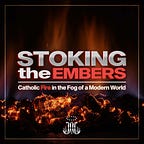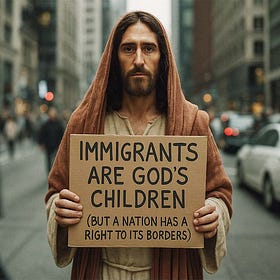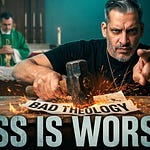This podcast is accompanied by an article, for those who are here to read, and aren’t interested in podcasts.
Description:
I respond to Pope Leo XIV’s comments about Cardinal Cupich’s decision to honor Senator Dick Durbin with an award. The Pope urged Catholics to look at Durbin’s “overall record” — a fair point rooted in Catholic moral tradition — but his remarks raised bigger questions about clarity, consistency, and what the faithful need from their shepherds. I explore why the Church’s message can’t afford to blur moral lines, why abortion and immigration are not morally equivalent issues, and what justice and mercy really demand of us as Catholics in today’s world.
Article:
This was produced from the transcript of the podcast. It’s partially AI-generated, with my own edits. It’s my thoughts, my commentary, my structure, my edits and insertions.
Cardinal Blase Cupich planned to give an award to Senator Dick Durbin for his work on immigration. The Senator ultimately declined the award after public outcry and objections from several bishops about honoring a public figure who supports abortion rights. But ahead of that, many Catholics — clergy and laity alike — were outraged, and not without reason. Durbin is openly pro-choice, and the optics of honoring him within a Catholic context are troubling. The Holy Father, when asked about the controversy, responded that we should look at the “overall work” of the senator — his full record of service — rather than focus on one issue.
Here’s what the Holy Father said when asked about his thoughts on the issue:
“I think that is very important to look at the overall work that a senator has done during forty years of service in the United States Senate. I understand the difficulty… but I think as I myself has spoken to the past, it’s important to look at many issues that are related to what is the teaching of the church. Someone who says I’m against abortion, but says I’m in favor the death penalty is not really pro life; someone who says that I’m against abortion, but I am in agreement with the inhuman treatment of immigrants in the United States, I don’t know if that’s pro-life so they’re very complex issues.”
At first, I was disappointed by the Pope’s comments. But before I get to that, I want to be fair. The idea of looking at someone’s total body of work is not wrong, or bad teaching. In fact, it’s consistent with Catholic moral tradition. We are called to see the whole person — not only their sins but also their virtues and good works. That’s how we see each other, and it’s how God sees us. He doesn’t define us solely by our failings but judges us by the totality of who we are. In that sense, the Pope’s comment is sound.
Still, there’s a problem. While it’s true that we must take the whole person into account, the faithful are left feeling abandoned when Church leaders speak in ways that blur moral clarity. The Pope could have easily added a single sentence affirming that abortion remains a grave moral evil. He didn’t. That omission left faithful Catholics holding the bag — trying to reconcile compassion with conviction while appearing foolish in the eyes of a world eager to make the Church look inconsistent, or at least “progressive” where faithful Catholics are seen as being stuck in the past.
Not All Issues Are Equal
The Holy Father drew a comparison between abortion, the death penalty, and the treatment of immigrants, suggesting that a true pro-life stance must encompass all these areas. That’s true in one sense — the dignity of human life is consistent from womb to tomb. But the issues are not morally equivalent. The Church’s teaching on abortion is absolute: the deliberate taking of innocent life is always a grave sin. Immigration policy, however, involves prudential judgment — moral reasoning about how best to apply principles of justice and charity to complex social realities.
No one argues that immigrants should be treated inhumanely. But it is not immoral to enforce immigration law or to expect that citizens should have priority in jobs and benefits funded by their taxes. St. Thomas Aquinas himself recognized that communities have the right to regulate entry and membership for the common good. We find this in the Summa Theologiae, where he discusses the Mosaic law’s rules for admitting foreigners into Israelite society.
“The Law excluded the Gentiles from the fellowship of the people, not wholly and for all time, but in certain respects and for a fixed time; both for the safeguarding of the people’s faith and for the preservation of peace. For if foreigners were allowed to mix with that people indiscriminately, there might be danger to the faith, either through the people being seduced by their idolatry, or through the foreigners blaspheming God’s name.”
— Summa Theologiae, I–II, q. 105, a. 3, ad 1
We can debate how best to apply that teaching, but it is not on the same moral plane as abortion. One is an intrinsic evil; the other is a matter of prudence.
Justice and Compassion Must Both Be Real
The narrative that immigrants — legal or illegal — are being treated cruelly in America is not always supported by reality. Many receive medical care, housing, and assistance that struggling citizens can’t access. When I was unemployed I received much less money per-month than immigrants receive in financial benefit. Is that just? Is it justice that a working-class family, barely getting by, sees their taxes fund benefits for people who entered the country illegally? That question deserves attention, too.
There are indeed good and decent people who come here seeking a better life, and want to live the American dream. But there are also criminals, drug traffickers, and violent offenders among them. The Church must be compassionate, but compassion does not mean ignoring justice or pretending the situation isn’t complex. It’s one thing to affirm the dignity of every person — quite another to equate that affirmation with an endorsement of open borders or unregulated migration.
What the Faithful Need from Their Shepherds
Ultimately, what disappointed me most about the Pope’s remarks was not their content, but their absence of pastoral reassurance. Catholics who objected to honoring Senator Durbin were not all being reactionary or irrational. Many of them were acting from a sincere sense of fidelity to the Church’s moral teaching. Their concerns deserved acknowledgment — not quiet dismissal.
RELATED:
Immigration Through a Catholic Lens
Immigration is one of those issues that exposes our deepest divides — political, cultural, and even religious. It’s easy to take sides, to shout slogans about borders or compassion, but the Truth is rarely that simple. When news breaks, like an ICE raid that guts a meatpacking plant in Omaha, Catholics and other Christians are forced to ask ourselves:











